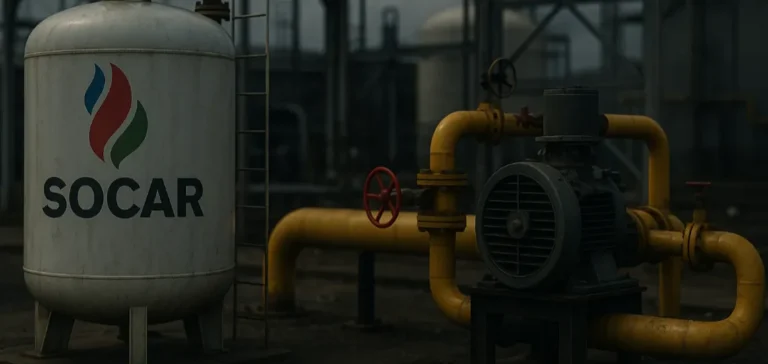The security of Azerbaijani gas deliveries to Ukraine is once again at the forefront, following several strikes attributed to Russia on energy transit infrastructure. The agreement signed at the end of July 2025 between SOCAR Energy Ukraine, a subsidiary of the State Oil Company of the Azerbaijan Republic (SOCAR), and the Ukrainian group Naftogaz may be tested if these attacks continue.
During the night of August 7 to 8, a strike targeted an oil depot operated by SOCAR and a compression station used to import liquefied natural gas (LNG) in the Odessa region. These facilities are directly involved in the logistics enabling the flow of Azerbaijani gas to Ukrainian territory via the Trans-Balkan corridor, which connects Azerbaijan to Central Europe through Bulgaria and Romania.
Unprecedented Gas Deal via the Trans-Balkan Corridor
On July 28, 2025, Naftogaz concluded its first gas import contract with SOCAR Energy Ukraine, marking the beginning of an unprecedented energy flow between the two countries. This delivery, described as a test by both parties, represents a strategic effort to diversify Kyiv’s natural gas supply sources, following its complete disengagement from Russian gas since 2015.
The volumes delivered remain limited at this stage, but the Ukrainian government emphasized the geopolitical importance of this new opening. Ukraine’s Ministry of Energy stated that the agreement resulted directly from diplomatic efforts led by Minister Svitlana Hrynchuk during her visit to Baku earlier this month. According to ministry officials, the cooperation is expected to strengthen as the winter season approaches.
Growing Risks to Transit Infrastructure
The escalation of Russian strikes on Azerbaijani energy assets in Ukraine poses a direct threat to the viability of this gas corridor. At the end of June, the Orlivka gas distribution station—a key point of the Trans-Balkan pipeline—was already damaged. These events raise questions about the continuity of logistical operations and the protection of energy infrastructure investments in the region.
Tensions were further underscored during a phone call on August 10 between Presidents Ilham Aliyev and Volodymyr Zelenskyy, during which both leaders expressed their opposition to the targeting of energy flows. Despite these attacks, both heads of state affirmed their commitment to maintaining cooperation in the gas sector.
Geopolitical Repercussions and Baku’s Response
In this context, the pro-government media outlet Caliber.Az reported that Baku could consider lifting its arms embargo on Ukraine if Russian strikes on its energy infrastructure persist. Although this information has not been officially confirmed by Azerbaijani authorities, it reflects a progressive deterioration in relations with Moscow.
This potential shift in posture fits into a broader framework of diplomatic realignment. The withdrawal of Russian peacekeepers from Nagorno-Karabakh in 2024, Azerbaijani accusations against Russia following an aviation incident in December of that same year, and allegations of cyberattacks in early 2025 have all contributed to the weakening of bilateral ties.
Restructuring of Regional Energy Flows
Azerbaijan’s traditional energy alignment with Russia appears to be evolving amid a broader redefinition of alliances and transit routes. The gas agreement with Ukraine—although limited in scale—symbolizes a step toward integrating Azerbaijani gas into Eastern European markets independent of Russian influence.
Moscow’s lack of military response to Baku’s recent strategic decisions, and the diversification of export routes—particularly via the Black Sea and European infrastructure—demonstrate a growing intent to secure energy independence in an unstable geopolitical environment. The continuity or disruption of these flows will largely depend on the evolution of the conflict and the effective protection of infrastructure on Ukrainian territory.






















